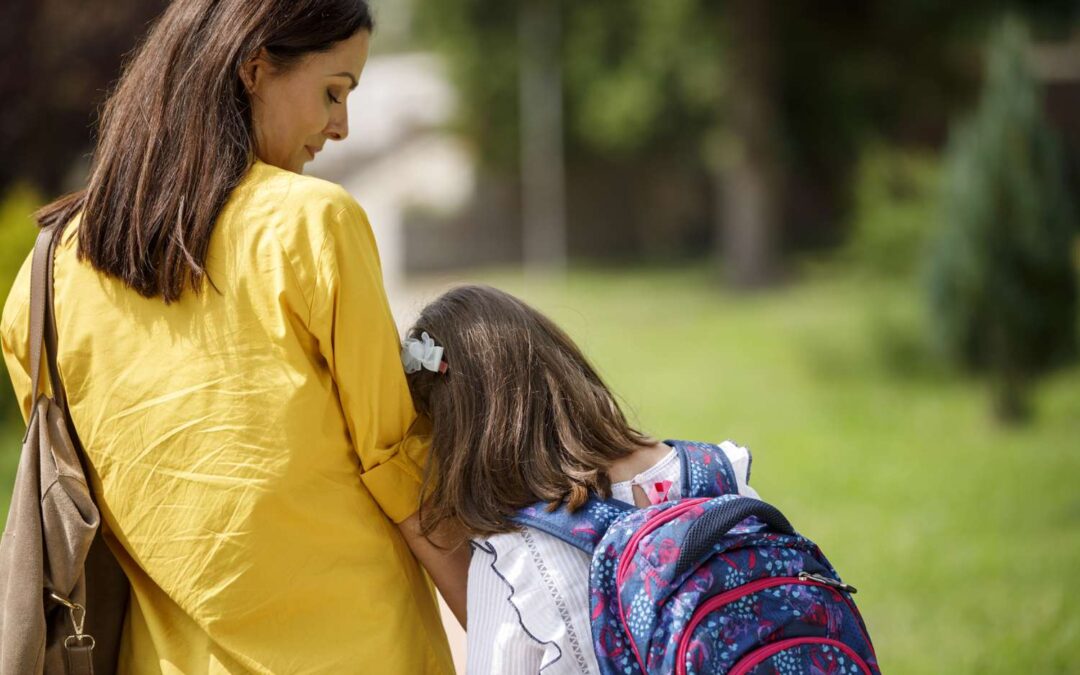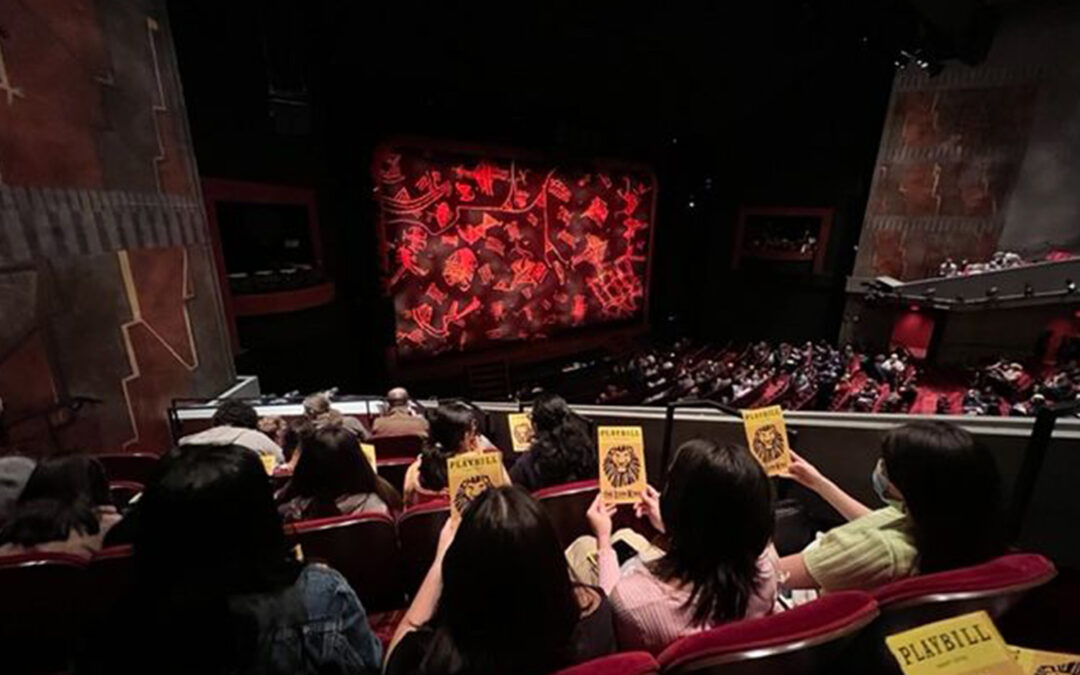
by North Shore Child & Family Guidance Center | Sep 26, 2024 | Anton Media, In The Media
By Juliette Owens, MHC, Originally published in Anton Media
As summer winds down, families face the challenge of reorienting children back into school routines. For many, this period involves the usual protests and complaints, as children resist returning to their structured schedules and time away from home. However, some families face a more serious issue known as school refusal, making the back-to-school transition particularly taxing on the family as a whole.
What is School Refusal?
School refusal, also referred to as school avoidance, refers to any kind of significant absenteeism accompanied by severe emotional distress. While not a formal diagnosis, it is a symptom associated with other mental health conditions, such as anxiety, depression, and post-traumatic stress disorder.
Children exhibiting school refusal may demonstrate avoidance behaviors in various ways, such as lateness and refusing to get out of bed, or leaving school early and acting out during class due to the more deeply rooted stressors. Once a child discovers an effective method of avoidance, it can escalate into a more persistent issue.
Distress associated with attending school can manifest in different ways, varying from child to child. Some may report physical symptoms of headaches or stomach aches, increased depression, anxiety, or aggression, and a resistance to getting ready for school.
School Refusal vs. Truancy
It can be challenging for parents to distinguish between school refusal and truancy, as both involve a child missing school. However, the underlying motivations and emotional responses are notably different, and understanding these differences is essential for providing appropriate support.
Truancy is often associated with older teenagers and is typically driven by external factors such as boredom, rebellion, or the influence of peers. In these cases, the avoidance of school is not due to emotional struggles, but a desire to seek out more enjoyable activities. Though truancy can sometimes be a form of acting out or asserting independence, it lacks the severe emotional distress seen in school refusal.
Unlike truancy, school avoidance is often rooted in significant mental health concerns that require professional attention. A child experiencing school refusal isn’t avoiding school for the sake of fun or rebellion; instead, they are overwhelmed by fear or discomfort at the thought of attending school. For these children, school is a source of distress that they feel unable to cope with, leading to a strong emotional and physical reaction.
What Parents Can Do
It’s important to practice active listening in order to understand their reasons for school avoidance. School can be intimidating due to a child’s fears of bullying, social isolation, public speaking, or failure. Recognizing that your child is not making their situation harder on purpose is important and allows your family to productively help as a unit.
Creating a comprehensive support system is the key to helping your child overcome the underlying issue of school refusal. Work with your child’s school to develop a plan that addresses their anxiety and facilitates school attendance. An outpatient mental health center, such as North Shore Child & Family Guidance Center, can address the underlying issues while advocating for accommodations at school to make the environment more manageable.
Know that your family is not alone. School refusal is a growing challenge, with rates rising by 5% partly due to the disruptions caused by the Covid-19 pandemic in which kids missed out on vital socialization, creating higher levels of anxiety when faced with large groups of their peers. However, with understanding, support, and the right resources, your family can navigate this difficult period and help your child successfully reenter the school environment.

by North Shore Child & Family Guidance Center | Jan 29, 2019 | Blog
Most parents have experienced a day here or there where their child or teen says they’re not going to go to school. They might complain of not feeling well or express anxiety over a test or be upset at a fight they had with a friend.
When those types of events are relatively rare, they are nothing for a parent to worry about. But when refusing to go to school becomes a habit, it’s important to take action to figure out what is causing this detrimental behavior.
“It’s understandable that parents get very frustrated when their child won’t go to school,” says Elissa Smilowitz, LCSW and Coordinator of Triage and Emergency Services at North Shore Child & Family Guidance Center. “Not only are the parents concerned for their child’s future, but they also often have to deal with tantrums, meltdowns or, in the worst cases, even physical blows.”
It’s very important to include the school when trying to find out why your child refuses to go. “You must find out what’s happening at school to get a sense of why your child is reluctant to go,” says Smilowitz. “It’s possible they are being bullied, or have trouble with a certain teacher, or are struggling with the work and are afraid to fail. There also may be a learning disability that has not been diagnosed.”
Smilowitz points out that ongoing school refusal often indicates an underlying mental health condition such as depression or anxiety. “If the behavior is ongoing, it’s important to seek professional help since there are possible long-term effects on a child’s social, emotional and academic development.”
In addition to talking with the school and seeking therapy, here are some other steps you can take:
- Get a comprehensive diagnostic assessment (talk to your school or therapist about resources).
- Also get a medical exam to rule out any physical causes, since children often complain about headaches, stomachaches and other bodily symptoms.
- Ask your child what is going on and listen carefully without shaming or judging them.
Another option is to find out what alternatives there are to traditional schools. For example, the Guidance Center runs a program called ISP, or Intensive Support Program. ISP offers intensive mental health services on-site at three Nassau B.O.C.E.S. schools for children, ages 5-21, and their families from all 56 Nassau County school districts.
To learn more about ISP, call the Guidance Center at (516) 626-1971 and ask to speak to Regina Barros-Rivera, extension 330. To find out more about our programs and services, click here or email info@northshorechildguidance.org.
![Professionals and Schools]()
by liz@eshildebrandtinc.com | Dec 10, 2020
Professionals and Schools Professionals and Schools Workshops for Education Professionals, Mental Health Professionals and Community Members The staff at North Shore Child & Family Guidance Center is composed of highly-trained psychiatrists, psychologists, social...

by North Shore Child & Family Guidance Center | Aug 9, 2022 | Anton Media, Blog, In The Media
By Erika Perez-Tobon, Published in Anton Media Newspapers
One of North Shore Child & Family Guidance Center’s signature programs is the Latina Girls Project, which was created in response to the alarming rates of depression, school refusal, self-harm, suicidal ideation and attempted suicides by Hispanic teen girls.
More than a decade ago, our team at the Guidance Center noticed an increasingly large number of first-generation Latinas were coming to us with severe depression, self-harming behaviors and suicidal thoughts. Many had stopped attending school, and some had been hospitalized for suicide attempts.
The research backed up what we were seeing at the time: Hispanic teenage girls were significantly more likely than their non-Hispanic peers to suffer from depression, thoughts of suicide and suicide attempts. More recent research, from the Centers for Disease Control and Prevention, showed that 10.5% of Latina adolescents aged 10–24 years in the U.S. attempted suicide in 2016, compared to 7.3% of white female, 5.8% of Latino and 4.6% white male teens.
In response to this crisis, we formed the Latina Girls Project, an innovative program that employs individual, group and family therapy, along with monthly outings and other activities, all designed to tackle issues such as depression, low self-esteem, social anxiety, school refusal, self-harming behaviors or suicidal ideation.
Some of our clients who were born outside the U.S. have witnessed violence in their homelands, and many have experienced complex trauma since a young age. Those who were born in the U.S. are impacted by the generational trauma experienced by their parents and limitations around communicating with their parents.
Regardless of where they were born, a big part of the reason these girls are struggling is because they are pulled in conflicting directions, with their parents wanting them to adhere to the traditional values of their homeland, while the girls seek to integrate into American culture and find acceptance among their peers.
The result: Parents are often extremely overprotective; they won’t allow their daughters to venture out and participate in activities such as sleepovers, dating or trips to the mall. Even if the teens are allowed to go out with their friends, they are required to have a chaperone, such as a parent or brother. In addition, they are often relegated to gender-biased roles, required to cook, clean and take care of their siblings while their brothers are treated, as one girl said, “like princes.”
During bilingual individual, family and group therapy sessions, the girls realize that they can trust their therapists, many of whom also grew up as first-generation Latinas. The therapists teach the girls healthy strategies to deal with stress and depression and effective ways to communicate with their parents.
For their part, the parents become more compassionate about their daughters’ desire to fit in, and they also understand the need to let their teens separate in age-appropriate ways. One of our Latina clients put it this way: “My parents learned that I just wanted them to be there for me and listen. They learned that it doesn’t help to question why I feel the way I do but to accept it and support me.”
In addition to therapy, the program incorporates monthly supervised outings to places such as theaters, museums and other cultural and educational sites. These trips, made possible by the generosity of John and Janet Kornreich, expose the girls to the world in a way that would never have happened if not for this Guidance Center program. The trips serve to boost the teens’ confidence and sense of independence, and the girls also discover that there’s a great big world of opportunity out there for them, which allows them to feel hopeful about their futures. The trips also offer respite to the parents who are relieved to know that their daughters are in safe hands.
As one girl put it, “The Latina Girls Project helped my mother and I communicate and become very close, and the monthly outings showed me a world I never would have seen. I felt that I wanted to be a part of the larger world. The trips gave me the feeling that I could be truly happy in my life.”
Bio: Erika Perez-Tobon, LCSW, who is originally from Venezuela, is the bilingual Clinical Supervisor of North Shore Child & Family Guidance Center’s Latina Girls Project, which is located at the agency’s Westbury location.



